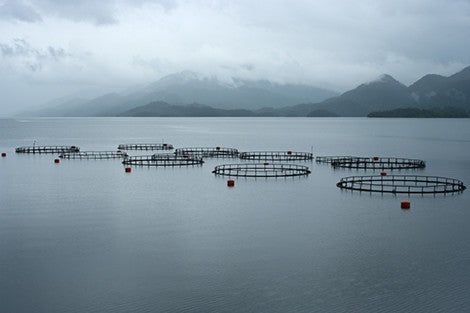June 26, 2014 — Aquaculture has become a booming industry in Chile, with salmon and other fish farmed in floating enclosures along the South Pacific coast. But as farmers densely pack these pens to meet demand, diseases can easily pass between fish — for example, an outbreak of infectious salmon anemia that emerged in 2007 caused the deaths of more than a million fish and threatened to cripple the industry. And unsustainable aquaculture methods can have a wider impact, spreading disease to the world’s already vulnerable ocean fisheries and contaminating the environment.
Earlier this year, Tamara Awerbuch Friedlander, an instructor in the Department of Global Health and Population at Harvard School of Public Health (HSPH), traveled to Chile to work with faculty members at the University of Antofagastato develop research and an academic curriculum focused on preventing the spread of diseases and parasites among farmed fish, and from aquacultures to the wild fish population, without the use of potentially harmful chemicals.
Awerbuch Friedlander uses mathematical modeling to study the complex social and biological systems behind the spread of diseases, and has previously focused on AIDS and Lyme disease, among others. In Antofagasta, she taught a three-week course on mathematical modeling to students, based on the long-running course she developed and teaches at HSPH. She described her approach as holistic. “I teach students to look at a range of factors relevant to the spread of a disease — such as ecological impact and human behavior — to develop a mathematical model. This can then be used to explore the effect of each factor in the presence of the others as well as new interventions.”
She and her Chilean colleagues hope to develop a strategy for promoting sustainable aquaculture that they can share with policy makers. Factors they are taking into account include the economic motivations of fish farmers and consumers’ aversion to the use of insecticides and antibiotics. Potential approaches for disease control could include keeping fewer fish in each pen and removing them before they have had time to become infested by potentially disease-causing insects, Awerbuch Friedlander said.
Her work in Chile this year was funded by the Fulbright Specialist Program. Scholars accepted into the program are added to a roster for five years and can be approached by researchers in other countries who are interested in their work. The program is an excellent opportunity that many researchers may not be aware of, but should be, Awerbuch Friedlander said. “For the next five years, I can look forward to collaborations around the world.”
Photo: iStockphoto/René Lorenz
